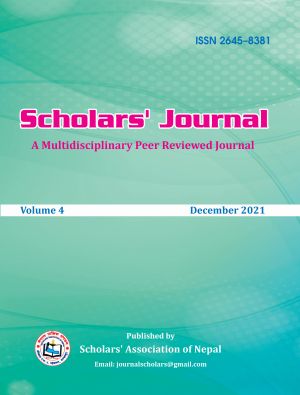दार्चुलेली भाषाका सामाजिक भेदहरूको अध्ययन {Study of Social differences of Darchuleli language}
DOI:
https://doi.org/10.3126/scholars.v4i1.42681Keywords:
autonomous, deformed, edited, समतलीय, स्वरूप, अपभ्रंश, सम्पादन,, स्वशासितAbstract
भाषा विचार विनिमयको शसक्त माध्यम हो । भाषाको माध्यमबाट सबै व्यक्तिहरुहरू एकआपसमा जोडिएका हुन्छन् । भाषाले सामाजिक मूल्य मान्यताका साथै सामाजिक संस्कारलाई बोकेको हुन्छ । भाषा आयोगको वार्षिक प्रतिवेदन (२०७७) अनुसार नेपालमा हाल १३१ ओटा भाषाहरू बोलिन्छन् । यी भाषाहरू मध्ये दार्चुलेली भाषा दार्चुला जिल्ला र सुदूरपश्चिम प्रदेशको भू–भागका साथै काठमाडौँसम्म प्रयोग व्यबहारमा आउने जनसम्पर्कको भाषा हो । प्रस्तुत लेखको उद्देश्य दार्चुलेली भाषाका सामाजिक भेदहरूको उल्लेख गर्नु रहेको छ । माथिको उद्देश्य पूरा गर्नका लागि गुणात्मक अनुसन्धान विधि अन्तर्गत अवस्था अध्ययन ढाँचाको प्रयोग गरी सामाजिक भाषिक भेदको सिद्धान्त अनुसार दार्चुलेली भाषाको सामाजिक भाषिक भेद पहिचान गरी नेपाली भाषामा अर्थ प्रस्तुत गरिएको छ । यस लेखका लागि दार्चुलेली मातृभाषी व्यक्तिहरुबाट प्राथमिक सामग्री सङ्कलनगरी सामाजिक तथा भाषाविज्ञानका सैद्धान्तिक पुस्तकहरू, जर्नल, प्रतिवेदनलाई द्वितीयक स्रोतका रूपमा उपयोग गरिएको छ । उल्लिखित सन्दर्भ अनुसार यस अध्ययनमा समाजका विभिन्न वर्ग, जात, जाति, व्यवसाय, लिङ्ग, शिक्षा, बसोबासको स्थिति आदिका आधारमा सामाजिक भाषिक भेद रहेको पाइन्छ । दार्चुलेली भाषाको वर्गीय भेदमा ठुला मानिएका जातिले काका, इजा, दाइ, चेली भनी प्रयोग गरेको पाइन्छ भने तल्लो मानिएका जातिले क्रमशः का, ज्या, दादा, परघरी भनेर भाषिक व्यबहार गरेको पाइन्छ । दार्चुलेली भाषामा तल्लो र माथिल्लो नाताबिचको सम्बन्धगत भाषिक व्यवहारमा सानाले ओ दा, ओ दी र ठुलाले सानालाई ए बुना, ए बुनी भनेर सम्बोधन गरेको पाइन्छ । दार्चुलेली भाषामा सामाजिक भाषिक भेद रहेको पाइन्छ । यस लेखबाट सामाजिक भाषिक विषयमा अनुसन्धान गर्ने अनुसन्धाता, विद्यार्थी, शिक्षक, स्थानीय पाठ्यक्रम निर्माता आदि लाभान्वित हुने आशा गरिएको छ । {Language is a powerful medium of communication. All people are connected to each other through language. Language carries social values as well as social culture. According to the annual report of the Language Commission (2077), 131 languages are currently spoken in Nepal. Among these languages, Darchuleli is the language of public relations used in Darchula district and the far western region as well as Kathmandu. The purpose of the present article is to mention the social differences of Darchuleli language. In order to fulfill the above objective, the meaning in Nepali language has been presented by identifying the socio-linguistic differences of Darchuleli language according to the principle of socio-linguistic differences using the condition study framework under qualitative research method. The primary source material for this article is a collection of primary materials from native speakers, and theoretical books, journals, and reports in social and linguistics are used as secondary sources. In the class distinction of Darchuleli language, it is found that the upper castes used kaka, ija, dai, cheli, while the lower castes used linguistic behavior as ka, jya, dada, parghari respectively. In the Darchuleli language, in the linguistic behavior of the lower and upper relatives, the younger ones are called O Da, O Di and the older ones are called A Buna, A Buni. There are socio-linguistic differences in Darchuleli language. This article is expected to benefit researchers, students, teachers, local curriculum developers, etc. who do research on socio linguistics.}
Downloads
Downloads
Published
How to Cite
Issue
Section
License

This work is licensed under a Creative Commons Attribution-NonCommercial 4.0 International License.
Copyright © The Authors

